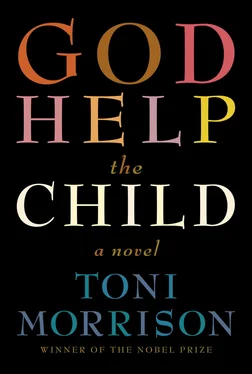There was not much left of Adam when he was found, but the details of the more recent abductions were Gothic. Apparently the children were kept bound while molested, tortured and there were amputations. The nicest man in the world must have used his small white terrier as a lure. A central witness, an elderly widow, remembered that she had seen a child in the passenger side of his van laughing and holding a little dog up to his face. Later, after seeing the missing-child posters displayed in store windows, on telephone poles and trees, she thought she recognized a face as that of the laughing boy. She called the police. Of course they knew the van. It advertised in red and blue letters its promise: PROBLEM? SOLVED! WM. V. HUMBOLDT. HOME REPAIR. When Mr. Humboldt’s house was searched a dirty mattress sporting dried blood was found in the basement along with an elaborately decorated candy tin that held carefully wrapped pieces of dry flesh, which, on not very close inspection, turned out to be small penises.
Public demands and cries for vengeance disguised as justice were rampant and harrowing. Signs, rallies in front of the courthouse, editorials — all seemed unassuageable by anything less than the culprit’s beheading. Booker joined the chorus but was not impressed by so facile a solution. What he wanted was not the man’s death; he wanted his life, and spent time inventing scenarios involving pain and despair without end. Wasn’t there a tribe in Africa that lashed the dead body to the back of the one who had murdered it? That would certainly be justice — to carry the rotting corpse around as a physical burden as well as public shame and damnation. The rage, the public clamor upon the conviction of the nicest man in the world, shook him almost as much as Adam’s death. The trial itself was not long but the preliminaries seemed eternal to Booker. Throughout the days of newspaper headlines, talk radio and neighborhood gossip he struggled to find some way to freeze and individualize his feelings, to separate them from the sorrow and frenzied anger of other families. Adam’s calamity, he thought, was not public fare to be confined to one line in a newspaper’s list of the six victims. It was private, belonging only to the two brothers. Two years later, a satisfactory and calming solution came to him. Reenacting the gesture he’d made at Adam’s funeral, he had a small rose tattooed on his left shoulder. Was this the same chair the predator sat in, the same needle used on his paste-white skin? He didn’t ask. The tattoo artist didn’t have the dazzling yellow of Booker’s memory, so they settled for an orangish kind of red.
Being accepted into college offered relief as well as distraction and he soon became enchanted with campus life — not the classes, not the professors, but his lively, know-it-all classmates, an enchantment that did not wane for two years. All he did from freshman year through sophomore was react — sneer, laugh, dismiss, find fault, demean — a young man’s version of critical thinking. He and his dorm mates ranked girls according to men’s magazines and porn videos, ranked one another according to characters in action movies they had seen. The clever ones breezed through classes; the geniuses dropped out. It was as a junior that his mild cynicism morphed into depression. The views of his classmates began to both bore and bother him, not only because they were predictable but also because they blocked serious inquiry. Unlike his effort to perfect “Wild Cat Blues” on his trumpet, no new or creative thinking was required in undergraduate society and none penetrated the blessed fog of young transgression. Student agitation about the war in Iraq that once roiled the campus had quieted. Now sarcasm fluttered its triumphant flag and giggles became its oath; now the docile manipulation of professors became routine. So Booker replayed those questions posed by his parents during those Saturday conferences on Decatur Street: 1. What have you learned that is true (and how do you know)? 2. What problem do you have?
1. So far nothing. 2. Despair.
So, hoping to learn something of value and perhaps find an accommodating place for despair, he applied to graduate school. There he focused on tracking wealth from barter to bombs. To him it was a riveting intellectual journey that policed his anger, caged it and explained everything about racism, poverty and war. The political world was anathema; its activists, both retro and progressive, seemed wrongheaded and dreamy. The revolutionaries, armed or peaceful, had no notion of what should happen after they “won.” Who would rule? The “people”? Please. What did that mean? The best outcome would be to introduce a new idea into the population that perhaps a politician would act on. The rest was theater seeking an audience. Wealth alone explained humanity’s evil, and he was determined to live without deference to it. He knew exactly the subjects and themes of the articles and books he would write and kept notes on his research. Other than the scholarship in his field he read a little poetry and some journals. No novels — great or lesser. He liked certain poems because they paralleled music, journals because the essays bled politics into culture. It was during his graduate school days that he began to write something other than outlines for future essays. He began trying to shape unpunctuated sentences into musical language that expressed his questions about or results of his thinking. Most of these he trashed; a few he kept.
Assured finally of his master’s degree, Booker traveled home alone for the celebratory dinner his mother had arranged. He thought about asking Felicity, his on-again, off-again girlfriend, to accompany him, but decided against it. He didn’t want an outsider judging his family. That was his job.
Everything was smooth and almost cheerful at the family gathering until he went upstairs to his old bedroom, the one he once shared with Adam. Looking for what, he was not sure. The room was not simply different; it was antagonistic — a double bed instead of his and Adam’s twin set, white transparent curtains instead of shades, a cutesy rug under a tiny desk. Worst of all, the closet that used to be jammed with their playthings — bats, basketballs, board games — now held his sister Carole’s girl clothes. But resentment choked him when he discovered that his old skateboard, identical to the one that disappeared along with Adam, was gone. Weak with sadness, Booker went back downstairs. But when he saw his sister, his pallid weakness changed into its blazing twin — fury. He picked a quarrel with Carole; she argued back. Their fight escalated and disturbed the whole family until Mr. Starbern shut it down.
“Stop it, Booker! You not the only one grieving. Folks mourn in different ways.” His father’s voice was like the steel of a knife’s edge.
“Yeah, sure.” Booker’s tone was hostile, laced with contempt.
“You acting like you the only one in this family who loved him. Adam wouldn’t want that,” said his father.
“You don’t know what he’d want.” Booker successfully fought back tears.
Mr. Starbern rose from the couch. “Well, I do know what I want. I want you civil in this house or out of it.”
“Oh, no,” Mrs. Starbern whispered. “Don’t say that.”
Father and son stared at each other, their eyes locking in military aggression. Mr. Starbern won the battle and Booker left the house, closing the door firmly behind him.
It was fitting, perhaps, that after leaving the only home he had ever known he would step out into a downpour. Rain forced him to raise his collar and duck his head like an intruder thankful for the night. Shoulders high, eyes squinting, he moved down Decatur Street in a mood the rainstorm complemented. Before his quarrel with Carole he’d tried to persuade his parents to think of some sort of memorial for Adam — a modest scholarship in his name, for example. His mother warmed to the idea, but his father frowned and was decidedly against it.
Читать дальше











